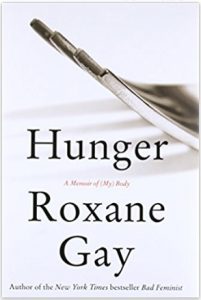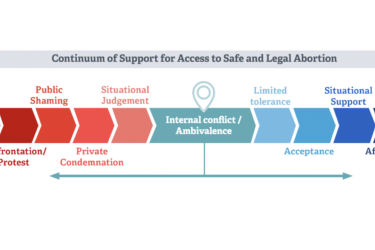Content note: This blog post mentions sexual assault.
 I read (and write) nonfiction all day long, so most of my me-time pleasure reading is limited to fiction. I recently made an exception on a friend’s recommendation and listened to the audiobook of Roxane Gay’s “Hunger,” as read by the author (which was important and relevant given its content).
I read (and write) nonfiction all day long, so most of my me-time pleasure reading is limited to fiction. I recently made an exception on a friend’s recommendation and listened to the audiobook of Roxane Gay’s “Hunger,” as read by the author (which was important and relevant given its content).
It was not an easy book to listen to, but I’m so glad that I did — both personally and for my work as a journalist. I think it’s a book every health journalist ought to consider reading if they are able. (My reason for saying “if they are able” will become apparent shortly.)
Gay describes her book as a “memoir of her body.” It’s a body that has wrangled for decades with two issues frequently in the headlines and covered by medical journalists: obesity and sexual assault. For Gay, both issues are intimately and inextricably connected as she relates a raw, difficult tale that offers insight and an opportunity for empathy development beneficial for any reporter writing about these issues.
By medical definition, Gay would be considered “super morbidly obese,” but she prefers to call herself “fat.” She is highly critical of both the medical community’s treatment of extremely large people and what she perceives as a public health “hysteria” over the “obesity epidemic.” While I did not agree with everything she writes on this topic, I found myself nodding along more often than shaking my head.
Gay describes some experiences that I have had myself. I recently gained a lot more empathy for large people when I joined the club (part of my motivation for reading the book). She describes a bias against people with obesity by health care providers (and its implications for obtaining adequate health care) that are well documented in the research literature. Health reporters who cover obesity issues should be aware of this bias.
Her intimate narrative provides insights into the patient perspective that journalists may rarely get even when interviewing patients. I would go so far as to say that what she shares is essential for journalists who interview patients with obesity to hear and consider.
The other major issue Gay confronts in the book is a gang rape that took place when she was 12 years old. She graphically recounts the details of this sexual assault, which she considers the stimulus for the excess eating that led to her weight gain. This section (and some others) may be too triggering for some people, so as I warned earlier, readers or listeners should exercise self-care when reading or listening to this book. (I suggest being in a location and/or among people who can help you deal with unexpected emotional fallout. I listened to it in the privacy of my car.)
I’ve used the words “raw” and “intimate” already to describe this book, but I cannot use them enough. Such intense honesty is rare even in memoirs, and it was hard not to wince during various passages. But that’s why I recommend “Hunger” to health journalists: Gay offers insight into experiencing two of the most incredibly challenging, complex and pressing issues of our time. It requires a far higher level of empathy, understanding and nuance than most issues about which we write.
Granted, we do write about these two topics a lot. As Gay herself notes, headlines about the obesity epidemic appear almost daily, and in the #MeToo era it’s hard also to avoid stories about sexual assault. If nothing else, journalists should find Gay’s perspective helpful when preparing to interview people who have had these experiences and it provides valuable background and context when reading medical studies on the topics.
After finishing the book, I admit that I was grateful to return to reading my YA fantasy/sci-fi and other indulgent fiction. But I’m also grateful that I broke up my routine to hear Gay’s story. I’m grateful to her for writing such a necessary book.
Writing this post also made me realize that it might be nice to recommend other worthwhile books for journalists covering medical studies. I may do a roundup of such books in the future and would love to hear your recommendations. What books do you think journalists who cover medical research should check out? It can be a how-to book, an expose into the healthcare system, a philosophy book or even a nonfiction narrative. Please leave your comments below, or email me at tara@healthjournalism.org.









